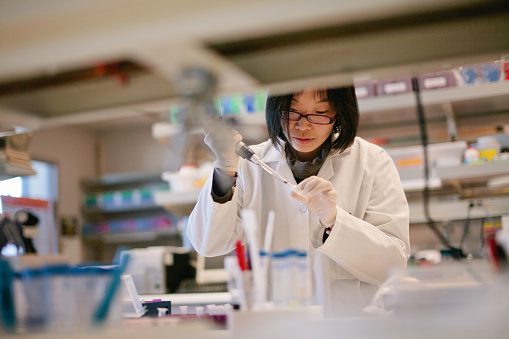
| Bioinformatics Engineer Key Stats | |
|---|---|
| Education | 4+ Years |
| Job Outlook | 16% |
A Bioinformatics Engineer is an extremely specialized professional who uses their knowledge in Information Technology (IT), Biology and Computer Science to develop and design intricate databases that store detailed biological information.
An important and well known example of biological information currently being stored is the human genome which was developed and researched through the year 2003 by the Human Genome Project (HGP).
Individuals interested in working with complex biological information and research as well as Information Technology and Computer Science can look at the requirements needed to become a Bioinformatics Engineer
Table of Contents
Education Requirements to Become a Bioinformatics Engineer
Individuals who want to become a Bioinformatics Engineer will need to learn a wealth information from different areas of specializations including: Engineering, Information Technology, Biology and Computer Science.
Recommended courses of study include a Bachelor’s degree in Bioinformatics Engineering.
During their undergrad career in Bioinformatics Engineering, an individual will take a variety of courses including:
- Bioinformatics
- Molecules
- Cells and Genes
- Chemistry
- Mathematics
- Genetics
- Statistics
- Software Project Management
- Biochemistry
- Discrete Mathematics
- Database Systems and
- Molecular Biology
As the list of classes suggests, individuals who want to become a Bioinformatics Engineer will need to focus their studies in mathematics, the sciences and computers in order to prepare themselves for this profession.
Although not required, most employers seek candidates with higher levels of education.
For better job prospects, individuals should look at acquiring an advanced degree such as a Master’s or PhD in Bioinformatics, Computer Science, Molecular Biology, Genetics or a closely related field that provides the equivalent amount of education in Information Technology, Biology and Computer Science.
Bioinformatics Engineer Job Description
Bioinformatics Engineers work in the Biotechnology industry and are specially trained to collect, study and manage biological data.
Bioinformatics Engineers use their attention to detail to process biological information at the molecular level as well as maintaining bio molecular sequences databases.
Because of the amount of detail and amount of data being collected, Bioinformatics Engineers use computers to process and analyze the information gathered during research.
In addition, Bioinformatics Engineers conduct research and use the principles of bioinformatics theory to work in Medical Technology, Pharmaceuticals, Biotechnology, Computational Biology, Biology, Computer Science and Medical Informatics fields.
Bioinformatics Engineers may also develop and design databases, create algorithms to process and analyze genomic or other biological information.
In addition, these professional may develop scientific software tools, software engineering, bioinformatics algorithm design, pipeline development and implementation.
Some typical day to day duties may also include:
- Lead the development of bioinformatics methods and algorithms for genomic data generation and analysis
- Incorporate bioinformatics tools for the delivery of efficient and automated pipelines for data analysis
- Create and track the quality metrics for sequencing and variant detection workflows
- Assist with the development of project plans
In addition to working extensively on projects, algorithms and other complex science and IT, Bioinformatics Engineers must also be able to work well with other individuals.
The development of projects requires working with other individuals and teams; the use of communication and interpersonal skills is also a quality and skill needed to succeed in these partnerships.
Bioinformatics Engineer Salary and Career Path
Biological Scientists, which includes Bioinformatics Engineers, can expect to earn a median wage of $72,720 per year according to 2013 figures.
Exact wages will depend on experience and the industry an individual works in.
For example, the highest earning Biological Scientists work in the Medical Equipment and Supplies Manufacturing industry and earn an average wage of $102,430, while professionals working for state governments earn the lowest wages at $54,070 per year.
Individuals who are interested in this profession may also look at being a Database Manager, but Bioinformatics Engineers typically earn more money than these professionals because of the amount of detail that is analyzed and maintained by a Bioinformatics Engineer.
Because of the advances in science and the medical field, individuals pursuing a career as a Bioinformatics Engineer can use their specialized skills to work in a variety of industries therefore creating plenty of job opportunities and a strong career path.
![]() The below information is based on the 2023 BLS national averages.
The below information is based on the 2023 BLS national averages.
National Average Salary
$106,700Average Salary by State
| State | Avg. Annual Salary |
|---|---|
| Arizona | $122,430 |
| California | $118,090 |
| Colorado | $111,820 |
| Connecticut | $103,890 |
| District of Columbia | $94,420 |
| Florida | $100,550 |
| Georgia | $103,730 |
| Illinois | $98,350 |
| Indiana | $93,290 |
| Iowa | $90,690 |
| Kansas | $107,810 |
| Kentucky | $100,080 |
| Maryland | $111,470 |
| Massachusetts | $107,280 |
| Michigan | $102,460 |
| Minnesota | $112,500 |
| Missouri | $73,380 |
| Montana | $94,830 |
| Nebraska | $84,110 |
| New Hampshire | - NA - |
| New Jersey | $115,420 |
| New Mexico | $139,460 |
| New York | $116,010 |
| North Carolina | $97,090 |
| North Dakota | $83,100 |
| Ohio | $101,100 |
| Oregon | $98,110 |
| Pennsylvania | $95,520 |
| Rhode Island | $108,930 |
| South Carolina | $124,560 |
| Tennessee | $99,600 |
| Texas | $94,190 |
| Utah | $95,340 |
| Vermont | $93,540 |
| Virginia | $99,820 |
| Washington | $114,750 |
| Wisconsin | $111,910 |
The top earning state in the field is New Mexico, where the average salary is $139,460.
These are the top 5 highest-paying states in the field:
* Employment conditions in your area may vary.
Frequently Asked Questions
What is a bioinformatics engineer?
Bioinformatics engineers combine Information Technology, Biology and Computer Science to build databases that store biological data.
They need knowledge in a variety of domains in order to be able to work with complex data, such as genetic information.
If you want to start a career in this field you should begin your training in high school, by taking science and math classes.
Bioinformatics engineers need good computer skills and should be creative people with interpersonal, analytical and problem-solving skills.
A bioinformatics engineer also needs biology knowledge and good communication skills.
Engineers who work in bioinformatics usually will team up with biologists and other scientists when they work on complex projects.
How much does a bioinformatics engineer make?
The Bureau of Labor Statistics doesn’t record specific data about bioinformatics engineers but they provide information about computer and information research scientists, in general.
The median annual salary for bioinformatics engineers was around $118,000 as of May 2018.
Those who work in the research and development field earned a median wage of approximately $129,000.
However, salaries vary based on a wide range of factors, including the engineer’s experience.
How much does it cost to become a bioinformatics engineer?
In order to become a bioinformatics engineer, you will need a bachelor’s degree in computer science, software engineering, or a related field.
If you decide to pursue a career in bioinformatics, you should also take biology classes in college.
Tuition costs for bachelor’s degree programs in computer science vary based on a wide range of factors.
A year of college can cost you anywhere between $20,000 and $70,000.
Getting a master’s degree can give you better job prospects and can cost an additional $30,000-$40,000 a year.
What is the demand for bioinformatics engineers?
The Bureau of Labor Statistics doesn’t record specific data about bioinformatics engineers however, employment for computer and information research scientists, in general, is expected to grow 16 percent from 2018 to 2028.
If you want a career in the bioinformatics field, in order to have the best job prospects, you will also need a background in biology.
How long does it take to become a bioinformatics engineer?
If you want to become a bioinformatics engineer you should start preparing in high school, by taking math, computer science, and science classes.
Bioinformatics engineers need a bachelor’s degree in computer science or a related field.
A bachelor’s degree can usually be obtained in four years.
The experience requirements depend on the employer, your level of education, and the job you are targeting.
Participating in an internship in college will help you get ready for entry-level employment in the field right after graduation.
Getting a master’s degree will give you better job prospects but will require another 2 years of training.













